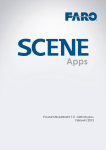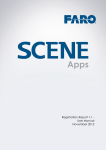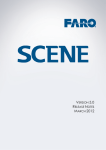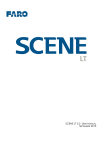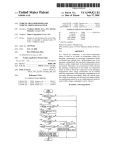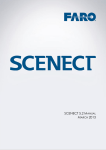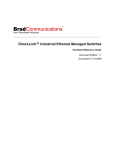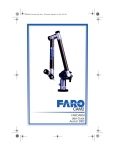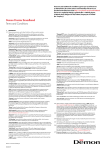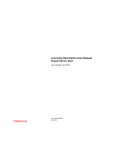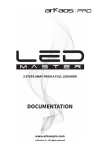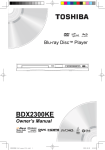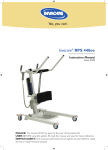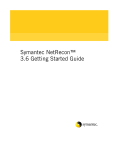Download Area Measurement Manual
Transcript
Area Measurement 1.1 - User Manual February 2013 Apps AREA MEASUREMENT 1.1 - USER MANUAL FEBRUARY 2013 Area Measurement 1.1 - User Manual | February 2013 ©FARO Technologies Inc., 2013. All rights reserved. For personal use, this publication may be reproduced or transmitted. For commercial use, no part of this publication may be reproduced, or transmitted in any form or by any means without written permission of FARO Technologies Inc. FARO TECHNOLOGIES, INC. MAKES NO WARRANTY, EITHER EXPRESS OR IMPLIED, INCLUDING BUT NOT LIMITED TO ANY IMPLIED WARRANTIES OF MERCHANTABILITY OR FITNESS FOR A PARTICULAR PURPOSE, REGARDING THE FAROARM, FARO LASER TRACKER, FARO LASER SCANNER AND ANY MATERIALS, AND MAKES SUCH MATERIALS AVAILABLE SOLELY ON AN “AS-IS” BASIS. IN NO EVENT SHALL FARO TECHNOLOGIES INC. BE LIABLE TO ANYONE FOR SPECIAL, COLLATERAL, INCIDENTAL, OR CONSEQUENTIAL DAMAGES IN CONNECTION WITH OR ARISING OUT OF THE PURCHASE OR USE OF THE FAROARM, FARO LASER TRACKER, FARO LASER SCANNER OR ITS MATERIALS. THE SOLE AND EXCLUSIVE LIABILITY TO FARO TECHNOLOGIES, INC., REGARDLESS OF THE FORM OF ACTION, SHALL NOT EXCEED THE PURCHASE PRICE OF THE MATERIALS DESCRIBED HEREIN. THE INFORMATION CONTAINED IN THIS MANUAL IS SUBJECT TO CHANGE WITHOUT NOTICE AND DOES NOT REPRESENT A COMMITMENT ON THE PART OF FARO TECHNOLOGIES INC. ACCEPTANCE OF THIS DOCUMENT BY THE CUSTOMER CONSTITUTES ACKNOWLEDGMENT THAT IF ANY INCONSISTENCY EXISTS BETWEEN THE ENGLISH AND NON-ENGLISH VERSIONS, THE ENGLISH VERSION TAKES PRECEDENCE. FARO Technologies Inc. Internal Control File Location: X:\CONTROL\RECORDS\05MANUFA\PARTSPEC\7 Software\E1063_Area_Measurement_1.1_Manual_EN.pdf Area Measurement 1.1 - User Manual February 2013 Table of Contents 1. Introduction .............................................................................................................. 1 2. Installation ............................................................................................................... 1 3. Measuring an Area ..................................................................................................... 2 3.1. Measuring an Area Based on a Selection of Scan Points ............................................ 2 3.2. Measuring an Area in an Already Existing Plane ....................................................... 6 3.3. Defining a Plane and Measuring an Area in this Plane ............................................... 8 3.4. Editing Area Measurements ................................................................................. 10 4. Reference Handbook ................................................................................................ 11 4.1. Toolbar ............................................................................................................. 11 4.2. Context Menu in 3D View during an Area Measurement .......................................... 11 4.3. Context Menu of an Area Measurement Object (in Structure View) ........................... 12 4.4. Context Menu of an Area Measurement Object (in 3D View) .................................... 12 4.5. Properties ......................................................................................................... 12 Technical Support ........................................................................................................... i Software License Agreement ........................................................................................... iii Implementation Notes .................................................................................................... v Poly2Tri..................................................................................................................... v GPL (GNU General Public License) ................................................................................ v LGPL .........................................................................................................................xi Trademarks ................................................................................................................ xiv Area Measurement 1.1 - User Manual | February 2013 1. Introduction The Area Measurement is a helpful add-on for SCENE or SCENE LT that extends the standard measurement functionality by enabling the user to measure areas in the 3D view of scans, workspaces or project point clouds. Basis for such an area measurement is a selection of scan points made by the user in the 3D view or a user defined area on an already available plane. The Area Measurement 1.1 works with version 5.1 of SCENE or SCENE LT. This manual describes the Area Measurement, its functions and how you can use it to determine the size of areas in your scan data. View online tutorials at http://tutorial.faroeurope.com to learn more about the use of SCENE and the SCENE apps. 2. Installation 1) Open SCENE or SCENE LT 2) If a previous version of the app is installed, remove this version first with the App Manager (available in SCENE or SCENE LT under Tools Apps). 3) Install the app by doing one of the following: Drag & Drop the app file (.fpp file) into SCENE or SCENE LT. Double click the app file in the Windows Explorer. Use the App Manager to install the app (see the SCENE or SCENE LT manual for more information). 4) Once installed, you should have this icon in your toolbar: Please note: This app is available in English language only but also runs if SCENE or SCENE LT are operated in other languages. 1 | Chapter 1: Introduction Area Measurement 1.1 - User Manual | February 2013 3. Measuring an Area There are three options to measure an area: based on a selection of scan points: a planar polygon will be calculated that matches best the selected scan points. The area of this polygon will then be determined. For more information, see chapter 3.1. based on a selected area in a pre-defined plane (limited or unlimited plane). For more information, see chapter 3.2. based on a selected area in a plane that the user has to create from the scan points first. For more information, see chapter 3.3. Select one of these options from the drop-down menu of the Area Measurement toolbar. Figure 3-1: Area measurement options 3.1. Measuring an Area Based on a Selection of Scan Points 1) Open the 3D view of a scan, scan folder, workspace or the project point cloud. 2) Click the Area Measurement icon in the toolbar or select Area measurement from its drop-down menu. A crosshair cursor in the 3D view shows you that the Area Measurement is enabled. 3) As known from the polygon selection tool of SCENE or SCENE LT, make a polygonal point selection of the area you would like to measure. Chapter 3: Measuring an Area | 2 Area Measurement 1.1 - User Manual | February 2013 Figure 3-2: Creating a polygonal point selection The surface of the selected polygon will be marked in transparent blue. If there are scan points in front of the polygon, its surface will not appear as fully closed. While selecting the polygon, the edge between the first and the last added corner point is drawn as a dashed line and will be replaced by two new edges when the next corner point is being added to the polygonal selection. If you want another edge to be replaced, just select it with the mouse and add the new point as usual. Figure 3-3: Edge drawn as a dashed line Corner points of the polygonal selection can be moved at any time during 3 | Chapter 3: Measuring an Area Area Measurement 1.1 - User Manual | February 2013 measurement. Just select a corner point and drag it with the mouse to another position, then continue the measurement as normal. The corner point will be moved along the already available and fitted polygon. Figure 3-4: Moving a corner point The planar polygon that matches best the selected scan points lies on a calculated orthogonal regression plane. In case you selected more than three corner points to define the polygon, the calculated orthogonal regression plane might not always match all selected points exactly. For this, a preview of the fitted polygon will be displayed with the corner points of the polygonal point selection in different colors, depending on their perpendicular distance to the fitting polygon. This helps recognizing potential outlier points that might have been mistakenly selected. The colors are: o Green: distance ≤ 5cm. o Yellow: distance > 5cm and < 20cm. o Red: distance ≥ 20cm. Figure 3-5: Fitted polygon with colored node points Chapter 3: Measuring an Area | 4 Area Measurement 1.1 - User Manual | February 2013 The app can only make an area measurement of non-intersecting polygons. If there are intersections, only the outline of the fitted polygon is drawn and intersecting edges will be drawn in red. In that case you may delete the last selected corner point(s) (with the BACKSPACE key) or move corner points until the intersections are resolved. Started point selections with intersections can be saved to the workspace with the RETURN key but their selected area cannot be determined until all intersections are resolved. You can always edit such point selections later to resolve intersections. For more information, see chapter 3.4. Figure 3-6: Intersections Available hot keys in this measurement mode are: Backspace: Removes the last selected corner point from the polygon ESCAPE: Disables the Area Measurement; an unfinished polygonal selection will be removed. Keeping CTRL pressed: Temporarily disables point selection, allows navigating in the view in examine mode. Keeping SHIFT pressed: Temporarily disables point selection, allows navigating in the view in the currently selected navigation mode. W, A, S, D, etc.: Movement in 3D view as usual. I: Defines a plane from the already selected scan points. This will exit this measuring option and project the selected points onto the plane. The area measurement will now be made based on an area in the created plane. This area has to be defined next. For more information, see chapter 3.2. RETURN: Complete the selection (and the measurement if there are no intersections) and save it to the workspace. 4) Complete the selection (if there are no intersections) with RETURN or double-click the last selected corner point. When completing, the line will be closed; in other words, the last 5 | Chapter 3: Measuring an Area Area Measurement 1.1 - User Manual | February 2013 fixed corner point is connected to the starting corner. The selection comprises all the scan points that are enclosed within the outline. An orthogonal regression plane will then be calculated to match best all the selected scan points. The selected polygon will be fitted to this plane and the area of the fitted polygon will be determined. The measurement result will be shown in the 3D view. Completed measurements are stored to the workspace. They are available in a sub folder of the Measurements folder. This sub folder is called Areas. Figure 3-7: Completed area measurement Selected area measurements will be displayed with dashed edges in the currently opened 3D view. Figure 3-8: Selected area measurement 3.2. Measuring an Area in an Already Existing Plane 1) Open the 3D view of a scan, scan folder, workspace or the project point cloud. Chapter 3: Measuring an Area | 6 Area Measurement 1.1 - User Manual | February 2013 2) Select an already available plane object in the structure view or the 3D view. This plane will be highlighted in the view. Figure 3-9: Selected plane 3) Select Area measurement in selected plane from the drop-down menu of the Area Measurement toolbar. A crosshair cursor in the 3D view shows you that the Area Measurement is enabled. 4) Make a (non-intersecting) polygonal selection to define the area to be measured by selecting points in the selected plane. These points don’t have to be scan points. As described in chapter 3.1, you can change the position of already selected points at any time during the measurement by dragging them with the mouse. Figure 3-10: Selected area on a plane 5) Complete the selection and the measurement with RETURN or double click on the last corner point of the selection. The completed measurement will be added to the Areas folder as described in 3.1. 7 | Chapter 3: Measuring an Area Area Measurement 1.1 - User Manual | February 2013 Figure 3-11: Completed area measurement The available hot keys are identical to the hot keys described in chapter 3.1. Hot key I has no function in this measuring mode. 3.3. Defining a Plane and Measuring an Area in this Plane 1) Open the 3D view of a scan, scan folder, workspace or the project point cloud. 2) Select Area measurement defining plane first from the drop-down menu of the Area Measurement toolbar. A crosshair cursor in the 3D view shows you that the Area Measurement is enabled. 3) Make a polygonal point selection in the 3D view to define the plane. Figure 3-12: Points selection to define the plane 4) Create the plane from the selected scan points with Return, I or double click on the last corner point of the selection. The points selected to define the plane will be kept Chapter 3: Measuring an Area | 8 Area Measurement 1.1 - User Manual | February 2013 and projected onto the plane. This selection will then be the starting point for the next step, the measurement. Figure 3-13: Plane 5) Continue creating a (non-intersecting) polygonal selection (by moving points, adding new points or removing existing points from the selection made in the previous step) to define the area to be measured by selecting corner points in the plane. These points don’t have to be scan points. As described in chapter 3.1, you can change the position of already selected points at any time during the measurement by dragging them with the mouse Figure 3-14: Selected area on the plane 6) Complete the selection and the measurement with RETURN or double click on the last selected corner point. The completed measurement and the plane will be added to the Areas folder as described in 3.1. 9 | Chapter 3: Measuring an Area Area Measurement 1.1 - User Manual | February 2013 Figure 3-15: Completed area measurement The available hot keys are identical to the hot keys described in chapter 3.1 3.4. Editing Area Measurements You can edit completed or saved but (due to intersections) unfinished measurements at any time: 1) Select the measurement in the structure view or in the 3D view. 2) Select Edit selected area measurement from the drop down menu in the area measurement tool bar or from the context menu of the area measurement in the 3D view (see also chapter 4.4). 3) Edit the measurement as usual by adding new points, deleting or moving existing points. 4) Complete the changed measurement with RETURN Pressing ESC cancels editing the measurement and restores it to its initial state. Chapter 3: Measuring an Area | 10 Area Measurement 1.1 - User Manual | February 2013 4. Reference Handbook 4.1. Toolbar Figure 4-1: Area measurement tool bar Clicking the icon - Start an area measurement based on a selection of scan points. For more information, see chapter 3.1. Drop-down menu: Area measurement - Same effect as clicking the icon (see above). Area measurement in selected plane – Start an area measurement in a selected plane. For more information, see chapter 3.2. Area measurement defining plane first – Define a plane and measure an area on this plane. For more information, see chapter 3.3. Edit selected area measurement – Edit a completed or saved but (due to intersections) unfinished measurement, see chapter 3.4. Help – Open this user manual. 4.2. Context Menu in 3D View during an Area Measurement Context menu, accessible when you right-click in the 3D view while creating an area measurement: Figure 4-2: Context menu – during area measurement Add scan point – Add another scan point to the measurement. Remove selected point – Removes the selected point from the polygon. Define plane from selected points - Defines a plane from the selected scan points. Select an area which you would like to measure on this plane. For more information, see chapter 3.2. Cancel - Disables the Area Measurement; an unfinished polygonal selection will be removed. Complete measurement - Complete the selection (and the measurement) 11 | Chapter 4: Reference Handbook Area Measurement 1.1 - User Manual | February 2013 4.3. Context Menu of an Area Measurement Object (in Structure View) Context menu, accessible when you right-click the area measurement object in the structure view: Figure 4-3: Context menu – area measurement object in structure view Locate - Find the area measurement in the currently opened and active 3D view of the workspace. The area measurement will be displayed in the center of this view. View 3D View – Open a 3D view of the area measurement object. Visible –Toggle visibility of the area measurement. Toggle the visibility of all measurement objects in the view by enabling or disabling the layer for Measurements in the Visibility Settings. Delete – Deletes the area measurement object. Rename – Renames the area measurement object. Properties –Opens the properties dialog of the area measurement object. 4.4. Context Menu of an Area Measurement Object (in 3D View) Context menu, accessible when you right-click the label of an area measurement in 3D view: Figure 4-4: Context menu – area measurement object in 3D view Edit selected area measurement – Edit the selected area measurement, see chapter 3.4. 4.5. Properties Access the properties of a volume measurement object from its context menu. Chapter 4: Reference Handbook | 12 Area Measurement 1.1 - User Manual | February 2013 Figure 4-5: Properties This properties dialog is similar to the properties dialog of a documentation object. Position - The position of the center of the area. Description - Information about the calculated area. You may edit this information. Hyperlinks – Add hyperlinks to web sites, local or shared documents. For more information, see the properties dialog of the documentation object in the SCENE or SCENE LT manual. 13 | Chapter 4: Reference Handbook Area Measurement 1.1 - User Manual | February 2013 Technical Support If you have any problem using one of our products, please follow these steps before contacting our Technical Support Team: • Be sure to read the relevant sections of the documentation to find the help you need. • Visit the FARO Customer Care area on the Web at www.faro.com to search our technical support database. This is available 24 hours a day 7 days a week. • Document the problem you are experiencing. Be as specific as you can. The more information you have, the easier the problem will be to solve. • If you still cannot resolve your problem, have your device’s Serial Number available before calling. • Support Hours (Monday through Friday) North America: 8:00 a.m. to 7:00 p.m. Eastern Standard Time (EST). Europe: 8:00 a.m. to 5:00 p.m. Central European Standard Time (CET). Asia: 8:30 a.m. to 5:30 p.m. Singapore Standard Time (SST). Japan: 9:00 a.m. to 5:00 p.m. Japan Standard Time (JST). China: 8:30 a.m. to 5:30 p.m. China Standard Time (CST). India: 9:30 a.m. to 5:30 p.m. India Standard Time (IST). You can also e-mail or fax any problems or questions 24 hours a day. • Phone North America: +1 800 736 2771, +1 407 333 3182 (Worldwide) Mexico: 866-874-1154 Europe: +800 3276 7378, +49 7150 9797-400 (Worldwide) Asia: +1 800 511 1360, +65 6511 1350 (Worldwide) Japan: +81 561 63 1411 (Worldwide) China: +400.677.6826 India: 1800.1028456 • Fax North America: i | Technical Support Area Measurement 1.1 - User Manual | February 2013 +1 407-562-5294 Europe: +800 3276 1737, +49 7150 9797-9400 (Worldwide) Asia: +65 6543 0111 Japan: +81 561 63 1412 China: +86 21 6494 8670 India: +91 11.4646.5660 • E-Mail North America: [email protected] Europe: [email protected] Asia: [email protected] Japan: [email protected] China: [email protected] India: [email protected] E-Mails or Faxes sent outside regular working hours usually are answered before 12:00 p.m. the next working day. Should our staff be on other calls, please leave a voice mail message; calls are always returned within 4 hours. Please remember to leave a detailed description of your question and your device’s Serial Number. Do not forget to include your name, fax number, telephone number and extension so we can reach you promptly. Technical Support | ii Area Measurement 1.1 - User Manual | February 2013 Software License Agreement This Software License Agreement is part of the operating manual for the product and software system which you have purchased from FARO TECHNOLOGIES INC. (collectively, the “Licenser”). By your use of the software you are agreeing to the terms and conditions of this Software License Agreement. Throughout this Software License Agreement, the term “Licensee” means the owner of the System. I. The Licensor hereby grants the Licensee the non exclusive right to use the computer software described in this Operating Manual (the “Software”). The Licensee shall have no right to sell, assign, sub-license, rent or lease the Software to any third party without the Licenser’s prior written consent. II. The Licenser further grants the Licensee the right to make a backup copy of the Software media. The Licensee agrees that it will not decompile, disassemble, reverse engineer, copy, transfer, or otherwise use the Software except as permitted by this Agreement. The Licensee further agrees not to copy any written materials accompanying the Software. III. The Licensee is licensed to use the Software only in the manner described in the Operating Manual. Use of the Software in a manner other than that described in the Operating Manual or use of the Software in conjunction with any non-Licenser product which decompiles or recompiles the Software or in any other way modifies the structure, sequence or function of the Software code, is not an authorized use, and further, such use voids the Licenser’s set forth below. IV. The only warranty with respect to the Software and the accompanying written materials is the warranty, if any, set forth in the Quotation/Purchase Order and Warranty Appendix B pursuant to which the Software was purchased from the Licenser. V. THIS WARRANTY IS IN LIEU OF OTHER WARRANTIES, EXPRESS OR IMPLIED, INCLUDING, BUT NOT LIMITED TO, THE IMPLIED WARRANTIES OF MERCHANTABILITY AND FITNESS FOR A PARTICULAR PURPOSE WITH RESPECT TO THE SOFTWARE AND WRITTEN MATERIALS. IN NO EVENT WILL THE LICENSER BE LIABLE FOR DAMAGES, INCLUDING ANY LOST PROFITS OR OTHER INCIDENTAL OR CONSEQUENTIAL DAMAGES ARISING OUT OF THE USE OR INABILITY TO USE THE SOFTWARE, NOTWITHSTANDING THAT THE LICENSER HAVE BEEN ADVISED OF THE POSSIBILITY OF SUCH DAMAGES, THE LICENSER WILL NOT BE LIABLE FOR ANY SUCH CLAIM BY ANY OTHER PARTY. VI. In the event of any breach by the Licensee of this Agreement, the license granted hereby shall immediately terminate and the Licensee shall return the Software media and all written materials, together with any copy of such media or materials, and the Licensee shall keep no copies of such items. VII. The interpretation of this Agreement shall be governed by the following provisions: a. This Agreement shall be construed pursuant to and governed by the substantive laws of the State of Florida (and any provision of Florida law shall not apply if the law of a state or jurisdiction other than Florida would otherwise apply). b. If any provision of this Agreement is determined by a court of competent jurisdiction to be void and non-enforceable, such determination shall not affect any other provision of this Agreement, and the remaining provisions of this Agreement shall remain in full force and effect. If any provision or term of this Agreement is susceptible to two or more constructions or interpretations, one or more of which would render the provision or term void or non-enforceable, the parties agree that a construction or interpretation which renders the term of provision valid shall be favored. c. This Agreement constitutes the entire Agreement, and supersedes all prior agreements and understandings, oral and written, among the parties to this Agreement with respect to the subject matter hereof. iii | Software License Agreement Area Measurement 1.1 - User Manual | February 2013 VIII. If a party engages the services of an attorney or any other third party or in any way initiates legal action to enforce its rights under this Agreement, the prevailing party shall be entitled to recover all reasonable costs and expenses (including reasonable attorney’s fees before trial and in appellate proceedings). Software License Agreement | iv Area Measurement 1.1 - User Manual | February 2013 Implementation Notes Poly2Tri Poly2Tri Copyright (c) 2009-2010, Poly2Tri Contributors http://code.google.com/p/poly2tri/ All rights reserved. Redistribution and use in source and binary forms, with or without modification, are permitted provided that the following conditions are met: * Redistributions of source code must retain the above copyright notice, this list of conditions and the following disclaimer. * Redistributions in binary form must reproduce the above copyright notice, this list of conditions and the following disclaimer in the documentation and/or other materials provided with the distribution. * Neither the name of Poly2Tri nor the names of its contributors may be used to endorse or promote products derived from this software without specific prior written permission. THIS SOFTWARE IS PROVIDED BY THE COPYRIGHT HOLDERS AND CONTRIBUTORS "AS IS" AND ANY EXPRESS OR IMPLIED WARRANTIES, INCLUDING, BUT NOT LIMITED TO, THE IMPLIED WARRANTIES OF MERCHANTABILITY AND FITNESS FOR A PARTICULAR PURPOSE ARE DISCLAIMED. IN NO EVENT SHALL THE COPYRIGHT OWNER OR CONTRIBUTORS BE LIABLE FOR ANY DIRECT, INDIRECT, INCIDENTAL, SPECIAL, EXEMPLARY, OR CONSEQUENTIAL DAMAGES (INCLUDING, BUT NOT LIMITED TO, PROCUREMENT OF SUBSTITUTE GOODS OR SERVICES; LOSS OF USE, DATA, OR PROFITS; OR BUSINESS INTERRUPTION) HOWEVER CAUSED AND ON ANY THEORY OF LIABILITY, WHETHER IN CONTRACT, STRICT LIABILITY, OR TORT (INCLUDING NEGLIGENCE OR OTHERWISE) ARISING IN ANY WAY OUT OF THE USE OF THIS SOFTWARE, EVEN IF ADVISED OF THE POSSIBILITY OF SUCH DAMAGE. GPL (GNU General Public License) GNU GENERAL PUBLIC LICENSE Version 3, 29 June 2007 Copyright (C) 2007 Free Software Foundation, Inc. <http://fsf.org/> Everyone is permitted to copy and distribute verbatim copies of this license document, but changing it is not allowed. Preamble The GNU General Public License is a free, copyleft license for software and other kinds of works. The licenses for most software and other practical works are designed to take away your freedom to share and change the works. By contrast, the GNU General Public License is intended to guarantee your freedom to share and change all versions of a program--to make sure it remains free software for all its users. We, the Free Software Foundation, use the GNU General Public License for most of our software; it applies also to any other work released this way by its authors. You can apply it to your programs, too. When we speak of free software, we are referring to freedom, not price. Our General Public Licenses are designed to make sure that you have the freedom to distribute copies of free software (and charge for them if you wish), that you receive source code or can get it if you want it, that you can change the software or use pieces of it in new free programs, and that you know you can do these things. To protect your rights, we need to prevent others from denying you these rights or asking you to surrender the rights. Therefore, you have certain responsibilities if you distribute copies of the software, or if you modify it: responsibilities to respect the freedom of others. For example, if you distribute copies of such a program, whether gratis or for a fee, you must pass on to the recipients the same freedoms that you received. You must make sure that they, too, receive or can get the source code. And you must show them these terms so they know their rights. v | Implementation Notes Area Measurement 1.1 - User Manual | February 2013 Developers that use the GNU GPL protect your rights with two steps: (1) assert copyright on the software, and (2) offer you this License giving you legal permission to copy, distribute and/or modify it. For the developers' and authors' protection, the GPL clearly explains that there is no warranty for this free software. For both users' and authors' sake, the GPL requires that modified versions be marked as changed, so that their problems will not be attributed erroneously to authors of previous versions. Some devices are designed to deny users access to install or run modified versions of the software inside them, although the manufacturer can do so. This is fundamentally incompatible with the aim of protecting users' freedom to change the software. The systematic pattern of such abuse occurs in the area of products for individuals to use, which is precisely where it is most unacceptable. Therefore, we have designed this version of the GPL to prohibit the practice for those products. If such problems arise substantially in other domains, we stand ready to extend this provision to those domains in future versions of the GPL, as needed to protect the freedom of users. Finally, every program is threatened constantly by software patents. States should not allow patents to restrict development and use of software on general-purpose computers, but in those that do, we wish to avoid the special danger that patents applied to a free program could make it effectively proprietary. To prevent this, the GPL assures that patents cannot be used to render the program non-free. The precise terms and conditions for copying, distribution and modification follow. TERMS AND CONDITIONS 0. Definitions. "This License" refers to version 3 of the GNU General Public License. "Copyright" also means copyright-like laws that apply to other kinds of works, such as semiconductor masks. "The Program" refers to any copyrightable work licensed under this License. "Licensees" and "recipients" may be individuals or organizations. Each licensee is addressed as "you". To "modify" a work means to copy from or adapt all or part of the work in a fashion requiring copyright permission, other than the making of an exact copy. The resulting work is called a "modified version" of the earlier work or a work "based on" the earlier work. A "covered work" means either the unmodified Program or a work based on the Program. To "propagate" a work means to do anything with it that, without permission, would make you directly or secondarily liable for infringement under applicable copyright law, except executing it on a computer or modifying a private copy. Propagation includes copying, distribution (with or without modification), making available to the public, and in some countries other activities as well. To "convey" a work means any kind of propagation that enables other parties to make or receive copies. interaction with a user through a computer network, with no transfer of a copy, is not conveying. Mere An interactive user interface displays "Appropriate Legal Notices" to the extent that it includes a convenient and prominently visible feature that (1) displays an appropriate copyright notice, and (2) tells the user that there is no warranty for the work (except to the extent that warranties are provided), that licensees may convey the work under this License, and how to view a copy of this License. If the interface presents a list of user commands or options, such as a menu, a prominent item in the list meets this criterion. 1. Source Code. The "source code" for a work means the preferred form of the work for making modifications to it. "Object code" means any non-source form of a work. A "Standard Interface" means an interface that either is an official standard defined by a recognized standards body, or, in the case of interfaces specified for a particular programming language, one that is widely used among developers working in that language. The "System Libraries" of an executable work include anything, other than the work as a whole, that (a) is included in the normal form of packaging a Major Component, but which is not part of that Major Component, and (b) serves only to enable use of the work with that Major Component, or to implement a Standard Interface for which an implementation is available to the public in source code form. A "Major Component", in this context, means a major essential component (kernel, window system, and so on) of the specific operating system (if any) on which the executable work runs, or a compiler used to produce the work, or an object code interpreter used to run it. The "Corresponding Source" for a work in object code form means all the source code needed to generate, install, and (for an executable work) run the object code and to modify the work, including scripts to control those activities. However, it does not include the work's System Libraries, or general-purpose tools or generally available free programs which are used unmodified in performing those activities but which are not part of the work. For example, Implementation Notes | vi Area Measurement 1.1 - User Manual | February 2013 Corresponding Source includes interface definition files associated with source files for the work, and the source code for shared libraries and dynamically linked subprograms that the work is specifically designed to require, such as by intimate data communication or control flow between those subprograms and other parts of the work. The Corresponding Source need not include anything that users can regenerate automatically from other parts of the Corresponding Source. The Corresponding Source for a work in source code form is that same work. 2. Basic Permissions. All rights granted under this License are granted for the term of copyright on the Program, and are irrevocable provided the stated conditions are met. This License explicitly affirms your unlimited permission to run the unmodified Program. The output from running a covered work is covered by this License only if the output, given its content, constitutes a covered work. This License acknowledges your rights of fair use or other equivalent, as provided by copyright law. You may make, run and propagate covered works that you do not convey, without conditions so long as your license otherwise remains in force. You may convey covered works to others for the sole purpose of having them make modifications exclusively for you, or provide you with facilities for running those works, provided that you comply with the terms of this License in conveying all material for which you do not control copyright. Those thus making or running the covered works for you must do so exclusively on your behalf, under your direction and control, on terms that prohibit them from making any copies of your copyrighted material outside their relationship with you. Conveying under any other circumstances is permitted solely under the conditions stated below. Sublicensing is not allowed; section 10 makes it unnecessary. 3. Protecting Users' Legal Rights From Anti-Circumvention Law. No covered work shall be deemed part of an effective technological measure under any applicable law fulfilling obligations under article 11 of the WIPO copyright treaty adopted on 20 December 1996, or similar laws prohibiting or restricting circumvention of such measures. When you convey a covered work, you waive any legal power to forbid circumvention of technological measures to the extent such circumvention is effected by exercising rights under this License with respect to the covered work, and you disclaim any intention to limit operation or modification of the work as a means of enforcing, against the work's users, your or third parties' legal rights to forbid circumvention of technological measures. 4. Conveying Verbatim Copies. You may convey verbatim copies of the Program's source code as you receive it, in any medium, provided that you conspicuously and appropriately publish on each copy an appropriate copyright notice; keep intact all notices stating that this License and any non-permissive terms added in accord with section 7 apply to the code; keep intact all notices of the absence of any warranty; and give all recipients a copy of this License along with the Program. You may charge any price or no price for each copy that you convey, and you may offer support or warranty protection for a fee. 5. Conveying Modified Source Versions. You may convey a work based on the Program, or the modifications to produce it from the Program, in the form of source code under the terms of section 4, provided that you also meet all of these conditions: a) The work must carry prominent notices stating that you modified it, and giving a relevant date. b) The work must carry prominent notices stating that it is released under this License and any conditions added under section 7. This requirement modifies the requirement in section 4 to "keep intact all notices". c) You must license the entire work, as a whole, under this License to anyone who comes into possession of a copy. This License will therefore apply, along with any applicable section 7 additional terms, to the whole of the work, and all its parts, regardless of how they are packaged. This License gives no permission to license the work in any other way, but it does not invalidate such permission if you have separately received it. d) If the work has interactive user interfaces, each must display Appropriate Legal Notices; however, if the Program has interactive interfaces that do not display Appropriate Legal Notices, your work need not make them do so. A compilation of a covered work with other separate and independent works, which are not by their nature extensions of the covered work, and which are not combined with it such as to form a larger program, in or on a volume of a storage or distribution medium, is called an "aggregate" if the compilation and its resulting copyright are not used to limit the access or legal rights of the compilation's users beyond what the individual works permit. Inclusion of a covered work in an aggregate does not cause this License to apply to the other parts of the aggregate. 6. Conveying Non-Source Forms. vii | Implementation Notes Area Measurement 1.1 - User Manual | February 2013 You may convey a covered work in object code form under the terms of sections 4 and 5, provided that you also convey the machine-readable Corresponding Source under the terms of this License, in one of these ways: a) Convey the object code in, or embodied in, a physical product (including a physical distribution medium), accompanied by the Corresponding Source fixed on a durable physical medium customarily used for software interchange. b) Convey the object code in, or embodied in, a physical product (including a physical distribution medium), accompanied by a written offer, valid for at least three years and valid for as long as you offer spare parts or customer support for that product model, to give anyone who possesses the object code either (1) a copy of the Corresponding Source for all the software in the product that is covered by this License, on a durable physical medium customarily used for software interchange, for a price no more than your reasonable cost of physically performing this conveying of source, or (2) access to copy the Corresponding Source from a network server at no charge. c) Convey individual copies of the object code with a copy of the written offer to provide the Corresponding Source. This alternative is allowed only occasionally and noncommercially, and only if you received the object code with such an offer, in accord with subsection 6b. d) Convey the object code by offering access from a designated place (gratis or for a charge), and offer equivalent access to the Corresponding Source in the same way through the same place at no further charge. You need not require recipients to copy the Corresponding Source along with the object code. If the place to copy the object code is a network server, the Corresponding Source may be on a different server (operated by you or a third party) that supports equivalent copying facilities, provided you maintain clear directions next to the object code saying where to find the Corresponding Source. Regardless of what server hosts the Corresponding Source, you remain obligated to ensure that it is available for as long as needed to satisfy these requirements. e) Convey the object code using peer-to-peer transmission, provided you inform other peers where the object code and Corresponding Source of the work are being offered to the general public at no charge under subsection 6d. A separable portion of the object code, whose source code is excluded from the Corresponding Source as a System Library, need not be included in conveying the object code work. A "User Product" is either (1) a "consumer product", which means any tangible personal property which is normally used for personal, family, or household purposes, or (2) anything designed or sold for incorporation into a dwelling. In determining whether a product is a consumer product, doubtful cases shall be resolved in favor of coverage. For a particular product received by a particular user, "normally used" refers to a typical or common use of that class of product, regardless of the status of the particular user or of the way in which the particular user actually uses, or expects or is expected to use, the product. A product is a consumer product regardless of whether the product has substantial commercial, industrial or non-consumer uses, unless such uses represent the only significant mode of use of the product. "Installation Information" for a User Product means any methods, procedures, authorization keys, or other information required to install and execute modified versions of a covered work in that User Product from a modified version of its Corresponding Source. The information must suffice to ensure that the continued functioning of the modified object code is in no case prevented or interfered with solely because modification has been made. If you convey an object code work under this section in, or with, or specifically for use in, a User Product, and the conveying occurs as part of a transaction in which the right of possession and use of the User Product is transferred to the recipient in perpetuity or for a fixed term (regardless of how the transaction is characterized), the Corresponding Source conveyed under this section must be accompanied by the Installation Information. But this requirement does not apply if neither you nor any third party retains the ability to install modified object code on the User Product (for example, the work has been installed in ROM). The requirement to provide Installation Information does not include a requirement to continue to provide support service, warranty, or updates for a work that has been modified or installed by the recipient, or for the User Product in which it has been modified or installed. Access to a network may be denied when the modification itself materially and adversely affects the operation of the network or violates the rules and protocols for communication across the network. Corresponding Source conveyed, and Installation Information provided, in accord with this section must be in a format that is publicly documented (and with an implementation available to the public in source code form), and must require no special password or key for unpacking, reading or copying. 7. Additional Terms. "Additional permissions" are terms that supplement the terms of this License by making exceptions from one or more of its conditions. Additional permissions that are applicable to the entire Program shall be treated as though they were included in this License, to the extent that they are valid under applicable law. If additional permissions apply only to part of the Program, that part may be used separately under those permissions, but the entire Program remains governed by this License without regard to the additional permissions. Implementation Notes | viii Area Measurement 1.1 - User Manual | February 2013 When you convey a copy of a covered work, you may at your option remove any additional permissions from that copy, or from any part of it. (Additional permissions may be written to require their own removal in certain cases when you modify the work.) You may place additional permissions on material, added by you to a covered work, for which you have or can give appropriate copyright permission. Notwithstanding any other provision of this License, for material you add to a covered work, you may (if authorized by the copyright holders of that material) supplement the terms of this License with terms: a) Disclaiming warranty or limiting liability differently from the terms of sections 15 and 16 of this License; or b) Requiring preservation of specified reasonable legal notices or author attributions in that material or in the Appropriate Legal Notices displayed by works containing it; or c) Prohibiting misrepresentation of the origin of that material, or requiring that modified versions of such material be marked in reasonable ways as different from the original version; or d) Limiting the use for publicity purposes of names of licensors or authors of the material; or e) Declining to grant rights under trademark law for use of some trade names, trademarks, or service marks; or f) Requiring indemnification of licensors and authors of that material by anyone who conveys the material (or modified versions of it) with contractual assumptions of liability to the recipient, for any liability that these contractual assumptions directly impose on those licensors and authors. All other non-permissive additional terms are considered "further restrictions" within the meaning of section 10. If the Program as you received it, or any part of it, contains a notice stating that it is governed by this License along with a term that is a further restriction, you may remove that term. If a license document contains a further restriction but permits relicensing or conveying under this License, you may add to a covered work material governed by the terms of that license document, provided that the further restriction does not survive such relicensing or conveying. If you add terms to a covered work in accord with this section, you must place, in the relevant source files, a statement of the additional terms that apply to those files, or a notice indicating where to find the applicable terms. Additional terms, permissive or non-permissive, may be stated in the form of a separately written license, or stated as exceptions; the above requirements apply either way. 8. Termination. You may not propagate or modify a covered work except as expressly provided under this License. Any attempt otherwise to propagate or modify it is void, and will automatically terminate your rights under this License (including any patent licenses granted under the third paragraph of section 11). However, if you cease all violation of this License, then your license from a particular copyright holder is reinstated (a) provisionally, unless and until the copyright holder explicitly and finally terminates your license, and (b) permanently, if the copyright holder fails to notify you of the violation by some reasonable means prior to 60 days after the cessation. Moreover, your license from a particular copyright holder is reinstated permanently if the copyright holder notifies you of the violation by some reasonable means, this is the first time you have received notice of violation of this License (for any work) from that copyright holder, and you cure the violation prior to 30 days after your receipt of the notice. Termination of your rights under this section does not terminate the licenses of parties who have received copies or rights from you under this License. If your rights have been terminated and not permanently reinstated, you do not qualify to receive new licenses for the same material under section 10. 9. Acceptance Not Required for Having Copies. You are not required to accept this License in order to receive or run a copy of the Program. Ancillary propagation of a covered work occurring solely as a consequence of using peer-to-peer transmission to receive a copy likewise does not require acceptance. However, nothing other than this License grants you permission to propagate or modify any covered work. These actions infringe copyright if you do not accept this License. Therefore, by modifying or propagating a covered work, you indicate your acceptance of this License to do so. 10. Automatic Licensing of Downstream Recipients. Each time you convey a covered work, the recipient automatically receives a license from the original licensors, to run, modify and propagate that work, subject to this License. You are not responsible for enforcing compliance by third parties with this License. An "entity transaction" is a transaction transferring control of an organization, or substantially all assets of one, or subdividing an organization, or merging organizations. If propagation of a covered work results from an entity transaction, each party to that transaction who receives a copy of the work also receives whatever licenses to the work the party's predecessor in interest had or could give under the previous paragraph, plus a right to possession of the ix | Implementation Notes Area Measurement 1.1 - User Manual | February 2013 Corresponding Source of the work from the predecessor in interest, if the predecessor has it or can get it with reasonable efforts. You may not impose any further restrictions on the exercise of the rights granted or affirmed under this License. For example, you may not impose a license fee, royalty, or other charge for exercise of rights granted under this License, and you may not initiate litigation (including a cross-claim or counterclaim in a lawsuit) alleging that any patent claim is infringed by making, using, selling, offering for sale, or importing the Program or any portion of it. 11. Patents. A "contributor" is a copyright holder who authorizes use under this License of the Program or a work on which the Program is based. The work thus licensed is called the contributor's "contributor version". A contributor's "essential patent claims" are all patent claims owned or controlled by the contributor, whether already acquired or hereafter acquired, that would be infringed by some manner, permitted by this License, of making, using, or selling its contributor version, but do not include claims that would be infringed only as a consequence of further modification of the contributor version. For purposes of this definition, "control" includes the right to grant patent sublicenses in a manner consistent with the requirements of this License. Each contributor grants you a non-exclusive, worldwide, royalty-free patent license under the contributor's essential patent claims, to make, use, sell, offer for sale, import and otherwise run, modify and propagate the contents of its contributor version. In the following three paragraphs, a "patent license" is any express agreement or commitment, however denominated, not to enforce a patent (such as an express permission to practice a patent or covenant not to sue for patent infringement). To "grant" such a patent license to a party means to make such an agreement or commitment not to enforce a patent against the party. If you convey a covered work, knowingly relying on a patent license, and the Corresponding Source of the work is not available for anyone to copy, free of charge and under the terms of this License, through a publicly available network server or other readily accessible means, then you must either (1) cause the Corresponding Source to be so available, or (2) arrange to deprive yourself of the benefit of the patent license for this particular work, or (3) arrange, in a manner consistent with the requirements of this License, to extend the patent license to downstream recipients. "Knowingly relying" means you have actual knowledge that, but for the patent license, your conveying the covered work in a country, or your recipient's use of the covered work in a country, would infringe one or more identifiable patents in that country that you have reason to believe are valid. If, pursuant to or in connection with a single transaction or arrangement, you convey, or propagate by procuring conveyance of, a covered work, and grant a patent license to some of the parties receiving the covered work authorizing them to use, propagate, modify or convey a specific copy of the covered work, then the patent license you grant is automatically extended to all recipients of the covered work and works based on it. A patent license is "discriminatory" if it does not include within the scope of its coverage, prohibits the exercise of, or is conditioned on the non-exercise of one or more of the rights that are specifically granted under this License. You may not convey a covered work if you are a party to an arrangement with a third party that is in the business of distributing software, under which you make payment to the third party based on the extent of your activity of conveying the work, and under which the third party grants, to any of the parties who would receive the covered work from you, a discriminatory patent license (a) in connection with copies of the covered work conveyed by you (or copies made from those copies), or (b) primarily for and in connection with specific products or compilations that contain the covered work, unless you entered into that arrangement, or that patent license was granted, prior to 28 March 2007. Nothing in this License shall be construed as excluding or limiting any implied license or other defenses to infringement that may otherwise be available to you under applicable patent law. 12. No Surrender of Others' Freedom. If conditions are imposed on you (whether by court order, agreement or otherwise) that contradict the conditions of this License, they do not excuse you from the conditions of this License. If you cannot convey a covered work so as to satisfy simultaneously your obligations under this License and any other pertinent obligations, then as a consequence you may not convey it at all. For example, if you agree to terms that obligate you to collect a royalty for further conveying from those to whom you convey the Program, the only way you could satisfy both those terms and this License would be to refrain entirely from conveying the Program. 13. Use with the GNU Affero General Public License. Notwithstanding any other provision of this License, you have permission to link or combine any covered work with a work licensed under version 3 of the GNU Affero General Public License into a single combined work, and to convey the resulting work. The terms of this License will continue to apply to the part which is the covered work, but the special requirements of the GNU Affero General Public License, section 13, concerning interaction through a network will apply to the combination as such. 14. Revised Versions of this License. Implementation Notes | x Area Measurement 1.1 - User Manual | February 2013 The Free Software Foundation may publish revised and/or new versions of the GNU General Public License from time to time. Such new versions will be similar in spirit to the present version, but may differ in detail to address new problems or concerns. Each version is given a distinguishing version number. If the Program specifies that a certain numbered version of the GNU General Public License "or any later version" applies to it, you have the option of following the terms and conditions either of that numbered version or of any later version published by the Free Software Foundation. If the Program does not specify a version number of the GNU General Public License, you may choose any version ever published by the Free Software Foundation. If the Program specifies that a proxy can decide which future versions of the GNU General Public License can be used, that proxy's public statement of acceptance of a version permanently authorizes you to choose that version for the Program. Later license versions may give you additional or different permissions. However, no additional obligations are imposed on any author or copyright holder as a result of your choosing to follow a later version. 15. Disclaimer of Warranty. THERE IS NO WARRANTY FOR THE PROGRAM, TO THE EXTENT PERMITTED BY APPLICABLE LAW. EXCEPT WHEN OTHERWISE STATED IN WRITING THE COPYRIGHT HOLDERS AND/OR OTHER PARTIES PROVIDE THE PROGRAM "AS IS" WITHOUT WARRANTY OF ANY KIND, EITHER EXPRESSED OR IMPLIED, INCLUDING, BUT NOT LIMITED TO, THE IMPLIED WARRANTIES OF MERCHANTABILITY AND FITNESS FOR A PARTICULAR PURPOSE. THE ENTIRE RISK AS TO THE QUALITY AND PERFORMANCE OF THE PROGRAM IS WITH YOU. SHOULD THE PROGRAM PROVE DEFECTIVE, YOU ASSUME THE COST OF ALL NECESSARY SERVICING, REPAIR OR CORRECTION. 16. Limitation of Liability. IN NO EVENT UNLESS REQUIRED BY APPLICABLE LAW OR AGREED TO IN WRITING WILL ANY COPYRIGHT HOLDER, OR ANY OTHER PARTY WHO MODIFIES AND/OR CONVEYS THE PROGRAM AS PERMITTED ABOVE, BE LIABLE TO YOU FOR DAMAGES, INCLUDING ANY GENERAL, SPECIAL, INCIDENTAL OR CONSEQUENTIAL DAMAGES ARISING OUT OF THE USE OR INABILITY TO USE THE PROGRAM (INCLUDING BUT NOT LIMITED TO LOSS OF DATA OR DATA BEING RENDERED INACCURATE OR LOSSES SUSTAINED BY YOU OR THIRD PARTIES OR A FAILURE OF THE PROGRAM TO OPERATE WITH ANY OTHER PROGRAMS), EVEN IF SUCH HOLDER OR OTHER PARTY HAS BEEN ADVISED OF THE POSSIBILITY OF SUCH DAMAGES. 17. Interpretation of Sections 15 and 16. If the disclaimer of warranty and limitation of liability provided above cannot be given local legal effect according to their terms, reviewing courts shall apply local law that most closely approximates an absolute waiver of all civil liability in connection with the Program, unless a warranty or assumption of liability accompanies a copy of the Program in return for a fee. END OF TERMS AND CONDITIONS Written Offer If you, the owner of the scanner, like to get a copy of the source code of GPL covered parts of the scanner’s firmware, please contact our support team [email protected]. This offer is valid for three years and valid for as long as FARO offers spare parts or customer support for this product model. LGPL Area Measurement includes the following applications and libraries, which are covered by the LGPL: • Eigen • CppUnit GNU LESSER GENERAL PUBLIC LICENSE Version 3, 29 June 2007 Copyright (C) 2007 Free Software Foundation, Inc. <http://fsf.org/> Everyone is permitted to copy and distribute verbatim copies of this license document, but changing it is not allowed. xi | Implementation Notes Area Measurement 1.1 - User Manual | February 2013 This version of the GNU Lesser General Public License incorporates the terms and conditions of version 3 of the GNU General Public License, supplemented by the additional permissions listed below. 0. Additional Definitions. As used herein, "this License" refers to version 3 of the GNU Lesser General Public License, and the "GNU GPL" refers to version 3 of the GNU General Public License. "The Library" refers to a covered work governed by this License, other than an Application or a Combined Work as defined below. An "Application" is any work that makes use of an interface provided by the Library, but which is not otherwise based on the Library. Defining a subclass of a class defined by the Library is deemed a mode of using an interface provided by the Library. A "Combined Work" is a work produced by combining or linking an Application with the Library. The particular version of the Library with which the Combined Work was made is also called the "Linked Version". The "Minimal Corresponding Source" for a Combined Work means the Corresponding Source for the Combined Work, excluding any source code for portions of the Combined Work that, considered in isolation, are based on the Application, and not on the Linked Version. The "Corresponding Application Code" for a Combined Work means the object code and/or source code for the Application, including any data and utility pro-grams needed for reproducing the Combined Work from the Application, but excluding the System Libraries of the Combined Work. 1. Exception to Section 3 of the GNU GPL. You may convey a covered work under sections 3 and 4 of this License without being bound by section 3 of the GNU GPL. 2. Conveying Modified Versions. If you modify a copy of the Library, and, in your modifications, a facility refers to a function or data to be supplied by an Application that uses the facility (other than as an argument passed when the facility is invoked), then you may convey a copy of the modified version: a) under this License, provided that you make a good faith effort to ensure that, in the event an Application does not supply the function or data, the facility still operates, and performs whatever part of its purpose remains meaningful, or b) under the GNU GPL, with none of the additional permissions of this License applicable to that copy. 3. Object Code Incorporating Material from Library Header Files. The object code form of an Application may incorporate material from a header file that is part of the Library. You may convey such object code under terms of your choice, provided that, if the incorporated material is not limited to numerical parameters, data structure layouts and accessors, or small macros, inline functions and templates (ten or fewer lines in length), you do both of the following: a) Give prominent notice with each copy of the object code that the Library is used in it and that the Library and its use are covered by this License. Implementation Notes | xii Area Measurement 1.1 - User Manual | February 2013 b) Accompany the object code with a copy of the GNU GPL and this license document. 4. Combined Works. You may convey a Combined Work under terms of your choice that, taken together, effectively do not restrict modification of the portions of the Library contained in the Combined Work and reverse engineering for debugging such modifications, if you also do each of the following: a) Give prominent notice with each copy of the Combined Work that the Library is used in it and that the Library and its use are covered by this License. b) Accompany the Combined Work with a copy of the GNU GPL and this license document. c) For a Combined Work that displays copyright notices during execution, include the copyright notice for the Library among these notices, as well as a reference directing the user to the copies of the GNU GPL and this license document. d) Do one of the following: 0) Convey the Minimal Corresponding Source under the terms of this License, and the Corresponding Application Code in a form suitable for, and under terms that permit, the user to recombine or relink the Application with a modified version of the Linked Version to produce a modified Combined Work, in the manner specified by section 6 of the GNU GPL for conveying Corresponding Source. 1) Use a suitable shared library mechanism for linking with the Library. A suitable mechanism is one that (a) uses at run time a copy of the Library already present on the user's computer system, and (b) will operate properly with a modified version of the Library that is interfacecompatible with the Linked Version. e) Provide Installation Information, but only if you would otherwise be required to provide such information under section 6 of the GNU GPL, and only to the extent that such information is necessary to install and execute a modified version of the Combined Work produced by recombining or relinking the Application with a modified version of the Linked Version. (If you use option 4d0, the Installation Information must accompany the Minimal Corresponding Source and Corresponding Application Code. If you use option 4d1, you must provide the Installation Information in the manner specified by section 6 of the GNU GPL for conveying Corresponding Source.) 5. Combined Libraries. You may place library facilities that are a work based on the Library side by side in a single library together with other library facilities that are not Applications and are not covered by this License, and convey such a combined library under terms of your choice, if you do both of the following: a) Accompany the combined library with a copy of the same work based on the Library, uncombined with any other library facilities, conveyed under the terms of this License. b) Give prominent notice with the combined library that part of it is a work based on the Library, and explaining where to find the accompanying uncombined form of the same work. 6. Revised Versions of the GNU Lesser General Public License. The Free Software Foundation may publish revised and/or new versions of the GNU Lesser General Public License from time to time. Such new versions will be similar in spirit to the present version, but may differ in detail to address new problems or concerns. xiii | Implementation Notes Area Measurement 1.1 - User Manual | February 2013 Each version is given a distinguishing version number. If the Library as you received it specifies that a certain numbered version of the GNU Lesser General Public License "or any later version" applies to it, you have the option of following the terms and conditions either of that published version or of any later version published by the Free Software Foundation. If the Library as you received it does not specify a version number of the GNU Lesser General Public License, you may choose any version of the GNU Lesser General Public License ever published by the Free Software Foundation. If the Library as you received it specifies that a proxy can decide whether future versions of the GNU Lesser General Public License shall apply, that proxy's public statement of acceptance of any version is permanent authorization for you to choose that version for the Library. Written Offer If you, the owner of the scanner, like to get a copy of the source code of LGPL covered parts of the scanner’s firmware, please contact our support team [email protected]. This offer is valid for three years and valid for as long as FARO offers spare parts or customer support for this product model. Trademarks FARO and FARO Laser Scanner Focus 3D are registered trademarks or trademarks of FARO Technologies Inc. All other brand and product names are trademarks or registered trademarks of their respective companies. Microsoft, Windows, Windows Vista, Windows XP and Windows 7 are either registered trademarks or trademarks of Microsoft Corporation in the United States and/or other countries. Trademarks | xiv Area Measurement 1.1 - User Manual | February 2013 FARO Technologies, Inc. 250 Technology Park Lake Mary, FL 32746 Tel. (800)-736-2771 U.S. / +1 407-333-3182 Worldwide E-Mail: [email protected] FARO Europe GmbH & Co. KG Lingwiesenstrasse 11/2 D-70825 Korntal-Münchingen, Germany Tel: +49 7150/9797-400 (FREECALL +800 3276 7378) Fax: +49 7150/9797-9400 (FREEFAX +800 3276 1737) E-Mail: [email protected] FARO Singapore Pte. Ltd. No. 03 Changi South Street 2 #01-01 Xilin Districentre Building B SINGAPORE 486548 TEL: +65 6511.1350 E-Mail: [email protected] FARO Japan, Inc. 716 Kumada, Nagakute-city, Aichi, 480-1144, Japan Tel: 0120-922-927, 0561-63-1411 FAX:0561-63-1412 E-Mail: [email protected] FARO (Shanghai) Co., Ltd. 1/F, Building No. 2, Juxin Information Technology Park 188 Pingfu Road, Xuhui District Shanghai 200231, China Tel.: 400.677.6826 Email: [email protected] FARO Business Technologies India Pvt. Ltd. E-12, B-1 Extension, Mohan Cooperative Industrial Estate, New Delhi-110044 India Tel.: 1800.1028456 Email: [email protected] xv | Trademarks

































